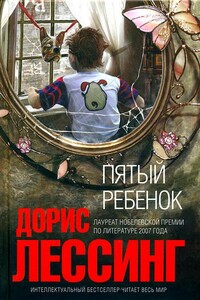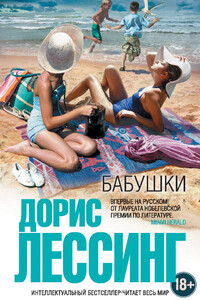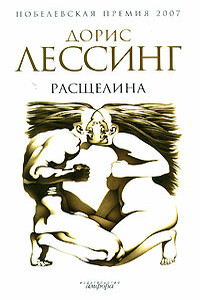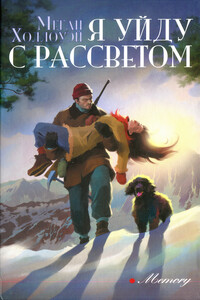Маленький Темби - [14]
Tembi was with his mother when she came to visit the cradle of the little white boy. Jane held out her hand to him and said: 'Tembi, how are you? Then she took her baby from the cradle and held it out, saying: 'Come and see my baby, Tembi. But Tembi backed away, as if afraid, and began to cry. 'Silly Tembi, said Jane affectionately; and sent the houseboy to fetch some fruit as a present. She did not make the gift herself, as she was holding her child.
She was absorbed by this new interest, and very soon found herself pregnant again. She did not forget little Tembi, but thought of him rather as he had been, the little toddler whom she had loved wistfully when she was childless. Once she caught sight of Tembi's mother walking along one of the farm roads, leading a child by the hand, and said: 'But where's Tembi? Then she saw the child was Tembi. She greeted him; but afterwards said to Willie: 'Oh dear, it's such a pity when they grow up, isn't it? 'He could hardly be described a$ grown-up, said Willie, smiling indulgently at her where she sat with her two infants on her lap. 'You won't be able to have them climbing all over you when we've a dozen, he teased her — they had decided to wait another two years and then have some more; Willie came from a family of nine children. 'Who said a dozen? exclaimed Jane tartly, playing up to him. 'Why not? asked Willie. 'We can afford it. 'How do you think I can do everything? grumbled Jane pleasantly. For she was very busy. She had not let the work at the clinic lapse; it was still she who did the ordering and planning of the labourers' food; and she looked after her children without help — she did not even have the customary native nanny. She could not really be blamed for losing touch with little Tembi.
He was brought to her notice one evening when Willie was having the usual discussion with the bossboy over the farm work. He was short of labour again and the rains had been heavy and the lands were full of weeds. As fast as the gangs of natives worked through a field it seemed that the weeds were higher than ever. Willie suggested that it might be possible to take some of the older children from their mothers for a few weeks. He already employed a gang of piccanins, of between about nine and fifteen years old, who did lighter work; but he was not sure that all the available children were working. The bossboy said he would see what he could find.
As a result of this discussion Willie and Jane were called one day to the front door by a smiling cookboy to see Little Tembi, now about six years old, standing proudly beside his father, who was also smiling. 'Here is a man to work for you,>1 said Tembi's father to Willie, pushing forward Tembi, who jibbed like a little calf, standing with his head lowered and his fingers in his mouth. He looked so tiny, standing all by himself, that Jane exclaimed compassionately: 'But, Willie, he's just a baby still! Tembi was quite naked, save for a string of blue beads cutting into the flesh of his fat stomach. Tembi's father explained that his older child, who was eight, had been herding the calves for a year now, and that there was no reason why Tembi should not help him.
'But I don't need two herdboys for the calves, protested Willie. And then, to Tembi: 'And now, my big man, what money do you want? At this Tembi dropped his head still lower, twisted his feet in the dust, and muttered: 'Five shillings. 'Five shillings a month! exclaimed Willie indignantly. 'What next! Why, the ten-year-old piccanins get that much. And then, feeling Jane's hand on his arm, he said hurriedly: 'Oh, all right, four and sixpence. He can help his big brother with the calves. Jane, Willie, the cookboy and Tembi's father stood laughing sympathetically as Tembi lifted his head, stuck out his stomach even farther, and swaggered off down the path, beaming with pride. 'Well, sighed Jane, 'I never would have thought it. Little Tembi! Why, it seems only the other day…
Tembi, promoted to a loincloth, joined his brother with the calves; and as the two children ran alongside the animals, everyone turned to look smiling after the tiny black child, strutting with delight, and importantly swishing the twig his father had cut him from the bush as if he were a full-grown driver with his team of beasts.
The calves were supposed to stay all day near the kraal; when the cows had been driven away to the grazing, Tembi and his brother squatted under a tree and watched the calves, rising to run, shouting, if one attempted to stray. For a year Tembi was apprentice to the job; and then his brother joined the gang of older piccanins who worked with the hoe. Tembi was then seven years old, and responsible for twenty calves, some standing higher than he. Normally a much older child had the job; but Willie was chronically short of labour, as all the fanners were, and he needed every pair of hands he could find, for work in the fields.
'Did you know your Tembi is a proper herdsboy now? Willie said to Jane, laughing, one day. 'What! exclaimed Jane. 'That baby! Why, it's absurd. She looked jealously at her own children, because of Tembi; she was the kind of woman who hates to think of her children growing up. But she now had three, and was very busy indeed. She forgot the little black boy.

Гарриет и Дэвиду с самого начала удается осуществить прекрасную мечту всех молодоженов: у них есть большой и уютный дом, стабильный доход, четверо счастливых и прелестных ребятишек и куча любящих родственников. Каникулы в их доме — изобильные праздники жизни и семейного счастья. А потом у них появляется пятый ребенок, ничего сверхъестественного… Но вот человек ли он?

Дорис Лессинг получила Нобелевскую премию по литературе с формулировкой: «Повествующей об опыте женщин, со скептицизмом, страстью и провидческой силой подвергшей рассмотрению разделенную цивилизацию». Именно об опыте женщин и о цивилизации, выставляющей барьеры природному началу, пойдет речь в книге «Бабушки». Это четыре истории, каждая из которых не похожа на предыдущую.Новелла, давшая название всей книге, — самая, пожалуй, яркая, искренняя, необычная.Что делать женщине, которая любит сына подруги? Природа подсказывает, что надо отдаться чувству, что никогда она не будет так счастлива, как в объятиях этого молодого человека.

Марта Квест, молодая романтичная идеалистка, бунтует против сложившегося монотонного уклада жизни. Ей хочется читать взахлеб, мечтать о несбыточном и танцевать до упаду. Ей хочется дать волю инстинктам в поисках мужчины своей мечты.«Марта Квест» — роман, переведенный на все европейские языки и выдержавший несколько десятков изданий. Книга, принесшая Дорис Лессинг, нобелевскому лауреату по литературе за 2007 год, мировую известность.

Британская писательница Дорис Лессинг – лауреат Нобелевской премии по литературе за 2007 год. Она обладает особым женским взглядом, который позволяет ей точно и в то же время с определенной долей скептицизма писать о разобщенности современного мира."Лето перед закатом" – роман, погружающий читателя в глубины расстроенной психики и безумия. Героиня романа – привлекательная женщина балзаковского возроста, оказывается оторванной от привычной жизни.

Саре Дурхам шестьдесят пять лет, и она уже не ждет от жизни никаких сюрпризов. Однако все меняется, когда экспериментальный театр, в котором работает Сара, решает поставить пьесу о Жюли Вэрон, красавице квартеронке, жившей в XIX веке. Один из лучших романов знаменитой английской писательницы Дорис Лессинг, лауреата Нобелевской премии за 2007 год.

Роман известной английской писательницы, лауреата Нобелевской премии Дорис Лессинг рассказывает о древней женской общине, существовавшей в прибрежной полосе Эдема. Женщины этой общины не знали мужчин и в них не нуждались. Деторождение управлялось лунным циклом, рожали они исключительно девочек. И вот появление на свет странного ребенка - мальчика - угрожает разрушить гармонию их существования…

Роман «Открытый город» (2011) стал громким дебютом Теджу Коула, американского писателя нигерийского происхождения. Книга во многом парадоксальна: герой, молодой психиатр, не анализирует свои душевные состояния, его откровенные рассказы о прошлом обрывочны, четкого зачина нет, а финалов – целых три, и все – открытые. При этом в книге отражены актуальные для героя и XXI века в целом общественно- политические проблемы: иммиграция, мультикультурализм, исторические психологические травмы. Книга содержит нецензурную брань. В формате PDF A4 сохранен издательский макет книги.

Джозеф Хансен (1923–2004) — крупнейший американский писатель, автор более 40 книг, долгие годы преподававший художественную литературу в Лос-анджелесском университете. В США и Великобритании известность ему принесла серия популярных детективных романов, главный герой которых — частный детектив Дэйв Брандсеттер. Роман «Год Иова», согласно отзывам большинства критиков, является лучшим произведением Хансена. «Год Иова» — 12 месяцев на рубеже 1980-х годов. Быт голливудского актера-гея Оливера Джуита. Ему за 50, у него очаровательный молодой любовник Билл, который, кажется, больше любит образ, созданный Оливером на экране, чем его самого.

Пристально вглядываясь в себя, в прошлое и настоящее своей семьи, Йонатан Лехави пытается понять причину выпавших на его долю тяжелых испытаний. Подающий надежды в ешиве, он, боясь груза ответственности, бросает обучение и стремится к тихой семейной жизни, хочет стать незаметным. Однако события развиваются помимо его воли, и раз за разом Йонатан оказывается перед новым выбором, пока жизнь, по сути, не возвращает его туда, откуда он когда-то ушел. «Необходимо быть в движении и всегда спрашивать себя, чего ищет душа, чего хочет время, чего хочет Всевышний», — сказал в одном из интервью Эльханан Нир.

Михаил Ганичев — имя новое в нашей литературе. Его судьба, отразившаяся в повести «Пробуждение», тесно связана с Череповецким металлургическим комбинатом, где он до сих пор работает начальником цеха. Боль за родную русскую землю, за нелегкую жизнь земляков — таков главный лейтмотив произведений писателя с Вологодчины.

В сборник вошли рассказы разных лет и жанров. Одни проросли из воспоминаний и дневниковых записей. Другие — проявленные негативы под названием «Жизнь других». Третьи пришли из ниоткуда, прилетели и плюхнулись на листы, как вернувшиеся домой перелетные птицы. Часть рассказов — горькие таблетки, лучше, принимать по одной. Рассказы сборника, как страницы фотоальбома поведают о детстве, взрослении и дружбе, путешествиях и море, испытаниях и потерях. О вере, надежде и о любви во всех ее проявлениях.

Отчаянное желание бывшего солдата из Уэльса Риза Гравенора найти сына, пропавшего в водовороте Второй мировой, приводит его во Францию. Париж лежит в руинах, кругом кровь, замешанная на страданиях тысяч людей. Вряд ли сын сумел выжить в этом аду… Но надежда вспыхивает с новой силой, когда помощь в поисках Ризу предлагает находчивая и храбрая Шарлотта. Захватывающая военная история о мужественных, сильных духом людях, готовых отдать жизнь во имя высоких идеалов и безграничной любви.